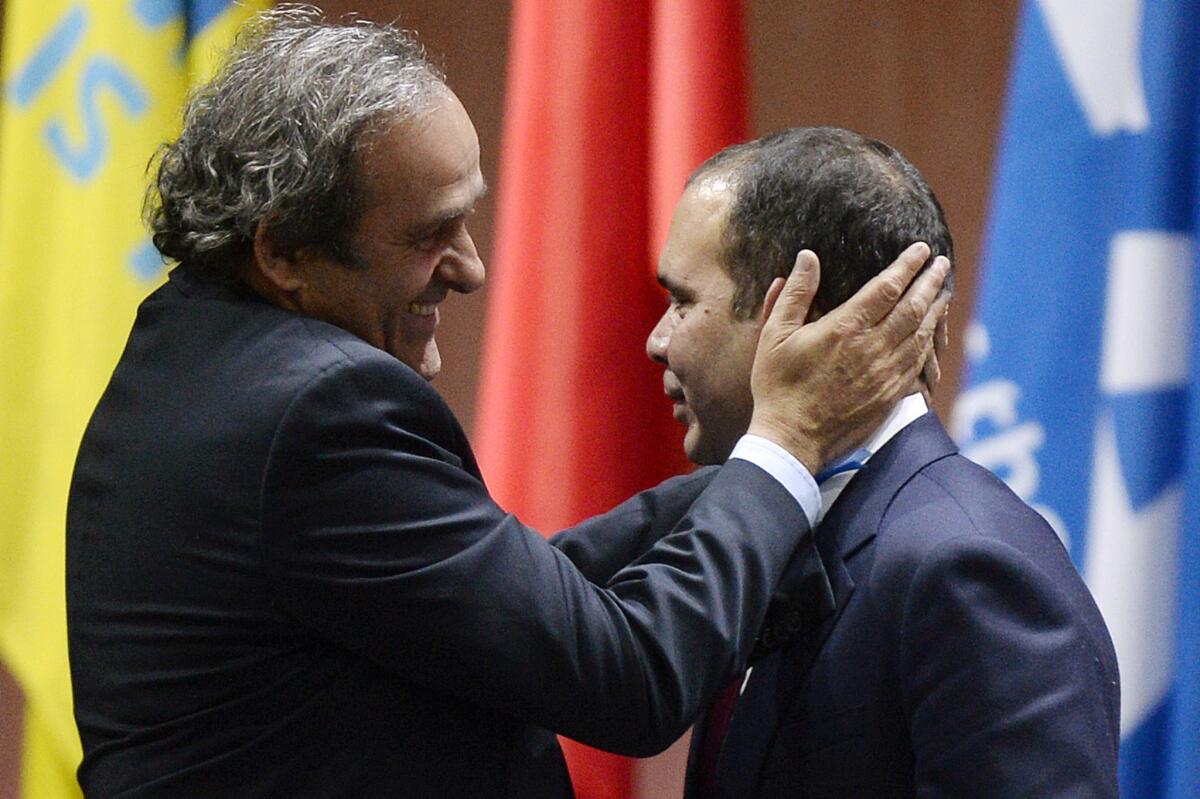If FIFA seeks to reform, here are steps it can take right away

UEFA President Michel Platini, left, embraces Prince Ali bin al-Hussein after he withdrew from the FIFA presidential election on May 29.
- Share via
Now that Sepp Blatter has announced he is stepping down as president of FIFA, the process of fixing world soccer’s governing body can finally begin.
But it won’t be easy.
The removal of one man, even if he is the president, is just the first step in a difficult process of fixing an organization as complex as FIFA, which is made up of 209 member federations, from political powerhouses such as China and the U.S. to tiny Anguilla and the Cook Islands, whose combined populations wouldn’t fill Dodger Stadium.
When the Department of Justice unsealed its 47-count indictment against nine current and former high-ranking FIFA officials last week, alleging crimes including wire fraud, racketeering, money laundering and bribery, it offered more than just a rare peek inside the organization. The scope of the allegations of corruption and secrecy also showed how truly reforming the organization may prove to be a Sisyphean task.
If it is serious about polishing its image and building some credibility, however, there are several steps FIFA can take immediately.
First, the organization must become completely transparent. That means no more back-room deals like the ones that awarded the 2018 World Cup to Russia and the 2022 tournament to Qatar, two countries that may not have won those bids in a more open voting process. One quick and easy way to prove it is serious about that would be to release the detailed report prepared by Michael Garcia, former U.S. attorney for the Southern District of New York, on the awarding of those two World Cups, a report that Blatter quashed last fall.
A new commitment to openness should also include a requirement that the closely held organization release its annual financial statements to the public. That would make the $10-million bribes alleged by the Justice Department in its indictments much more difficult to hide. And it would drive out officials whose first interest appeared to be not the sport but their personal interests.
It must find a new president who can both reform and unite FIFA once Blatter, who is now the focus of an investigation by the FBI, has retired as president. High on that list is Jordan’s Prince Ali bin al-Hussein, a FIFA vice president and the only man to challenge Blatter in last week’s elections.
At 39, Prince Ali would be the youngest FIFA leader in more than a century — an appealing trait given the fact that soccer’s fan base skews younger than those of many other sports. And with his country straddling the developing and developed worlds, Prince Ali’s candidacy would likely appeal to voters in both places.
Finally, the new FIFA needs a dramatic gesture beyond Blatter’s departure to show it means business. With the 2018 World Cup just three years away, it’s probably too late to move that event out of Russia. Besides, there is little to be gained by picking a fight with Russian President Vladimir Putin, who has already labeled the Justice Department’s case against FIFA part of a U.S. imperialist attack on his country.
The 2022 World Cup is a different story, though. Awarding the tournament to Qatar has already proved an embarrassment to FIFA, with international human rights groups claiming foreign workers brought to the country to build World Cup venues are being held in slave-like conditions. And the oppressive summer heat in the Middle Eastern monarchy has forced organizers to move the event from the summer to late fall for the first time in World Cup history.
So if the release of the Garcia report and ongoing probes by both U.S. and Swiss authorities provide damning evidence of irregularities in Qatar’s World Cup bid, FIFA should not hesitate to redo the vote.
But though any attempt at reforming FIFA will require a thorough housecleaning, it should be done carefully and with the understanding that the norms and customs are not the same throughout the organization’s member nations.
For example, bribes and kickbacks — albeit on a much smaller scale then those alleged in the indictments — are not only acceptable business practices in many developing countries, but have become absolutely essential to funding soccer there.
So although the departure of Blatter alone won’t cure FIFA, it does make change possible.
“This is the first of many steps towards real and meaningful reform within FIFA,” Sunil Gulati, president of U.S. Soccer, said in a statement. “Today is an occasion for optimism and belief for everyone who shares a passion for our game.”
Twitter: @kbaxter11
More to Read
Go beyond the scoreboard
Get the latest on L.A.'s teams in the daily Sports Report newsletter.
You may occasionally receive promotional content from the Los Angeles Times.











